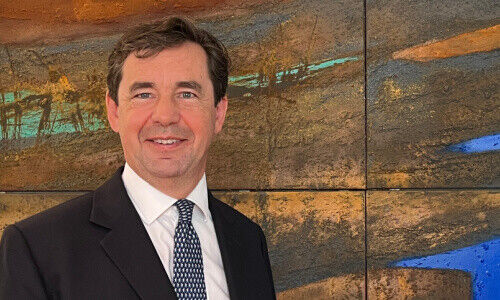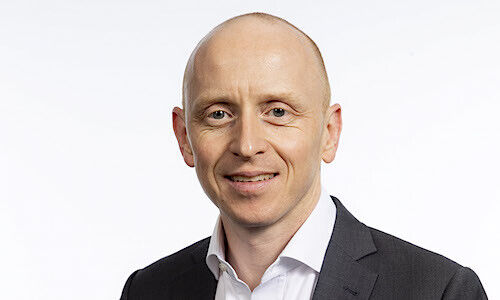Schroders CEO: «The Biggest Industry Mankind Has Ever Created»
As they prepare to fund the biggest industry shift in history, CEO Peter Harrison tells finews.asia why asset managers should be indifferent to whether a firm is public or private when building portfolios.
Asset managers are increasingly finding themselves working with companies to find out «what's the alternative to concrete and glass?» And with this growing complexity their investment approach is moving beyond «buying narrow sleeves of equities,» as they have done in the past, Schroders CEO Peter Harrison said.
Considering the amount of capital that needs to move in the next 20 to 30 years into food or energy industries for example, «buying the index and closing our eyes isn’t going to get us there,» Harrison said in an interview with finews.asia.
Market Crossover
At Schroders - which manages over $900 billion globally for institutional and private clients, running everything from private assets and alternative investments to mutual funds - Harrison already sees the areas of public and private markets «blending.» This is due to the size of public markets shrinking over the years and as many private companies choose to stay private for longer.
«Our role as an active manager is to think about where you get the best companies, where those new industries are coming from, and to direct capital to them,» regardless of which sphere of the market they are in, he said, adding «I don't think people have really appreciated the alpha opportunity of the blend.»
Shifting Values
Recent market developments where money has retreated from some of the most expensive stocks - fueled by money coming from passive funds - show that «the laws of stock valuations» are also in motion.
A future scenario where falling bond and equity markets could end up correlating with each other shows that while a 60/40 portfolio of bonds and equities was a perfectly balanced and easy approach to long-term investing for the past 20 to 30 years, it is unlikely to cut it going forward, he said.
«Figuring out what is going to work in this new environment is not going to be based on historical market capital analysis,» he added.
On the contrary, Harrison points to externalities having become all the more important for investment analysis with «impact» moving center stage, which creates «an opportunity to materially differentiate (investments) in the next period that wasn't there historically.»
Yet showing impact in a portfolio is a challenge many asset managers face as they find themselves in an «extraordinary situation» with very low levels of publicly available, formatted environmental, social, and governance (ESG) data, and very high levels of requirements.» Such a disparity will drive a much greater focus on data, forcing companies to disclose non-financial and unstructured data, he said.
Game-Changer
To meet clients’ demand to have a beneficial impact on society and the environment while generating returns on investments, in 2019 Schroders bought a majority stake in Zurich-based microfinance and impact investing pioneer BlueOrchard, which was founded by the UN in 2001.
The collaboration allows Schroders to include themes such as financial inclusion, Asian female empowerment, or insurance in Africa and offers clients products with «clarity of purpose.» It also demonstrates how «blended finance» works, by adding commercial capital to sustainable development projects while providing financial returns to investors.
For Harrison this is a «massive game-changer,» because it allows for structures whereby governments might take the first loss, he said.
Capturing Carbon
In the future, Harrison sees the focus on impact investing expanding towards nature restoration projects, such as carbon farming, which originates from regenerative agriculture and aims to improve the way CO2 is removed from the atmosphere and stored in plant material.
Replanting trees in the Amazon rainforest could serve as the foundation of such a biodiverse carbon asset. Assuming the cost of planting is 20x and the carbon credit can be sold at 100x. «That's a viable business,» Harrison said.
«As an industry, we need to get our head around what that means,» in terms of creating the projects and allowing people to invest in nature-based projects rather than just finance-based projects, he said.
Ubiquitous Wealth Creation
With a Swiss presence since 1967, Schroders’ 500 employees in Zurich and Geneva manage almost 100 billion Swiss francs ($104.7 billion) in the country across its asset management, wealth management, and private assets businesses, which it offers to institutional and private clients.
It hasn't counted Russians among private clients of its private bank since 2018 when Schroder & Co Bank closed its Eastern European desk. The move «felt like a good decision at the time and feels like an even better decision now.» It was related to infrastructure and the cost of doing business in those jurisdictions rather than to any judgment on clients held at the time, Harrison said.
«For me, it just was a risk that wasn't worth it. There's plenty of wealth generation going on in the world without having to stretch too far,» he said.
While this «global mobility of money» stands at odds with the clear «deglobalization» trend which has been going on for the past six or seven years, «(the financial services) industry is very fortuitous at being able to put both fund structures and talent where they are needed and «technology allows us to remain pretty global,» he said.
Big Moats
Governments becoming narrower in their outlooks, in face of supply chain challenges, security issues, and the current war in Ukraine has only resulted in additional costs for Schroder’s business which is conducted in 37 locations around the world.
Nor has Harrison been able to detect much change in the way Switzerland is seen internationally since it dropped its neutral stance and adopted the EU sanctions against Russia. Despite other financial centers such as Hong Kong and Singapore and Dubai gaining ground, he points out that Swiss finance, similar to the UK - where the impact of Brexit has been limited on Schroder’s UK business - is surrounded by a «big moat.»




























